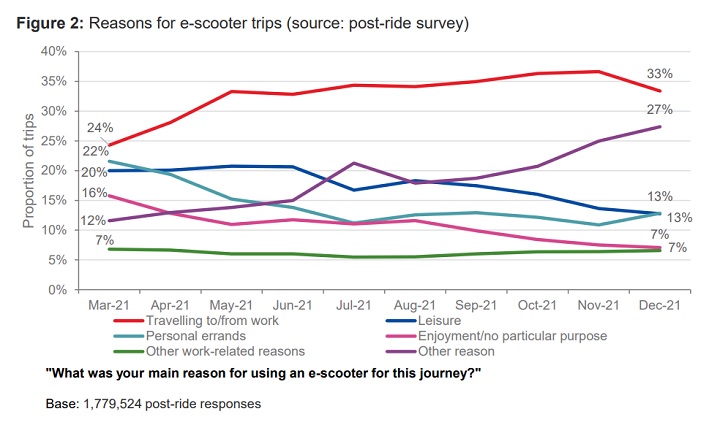The positives and negatives of e-scooters
Report into the official trials of e-scooters is published
The DfT’s has published its long-awaited evaluation of the e-scooters trials.
Their conclusion, that e-scooters could provide a real alternative mode of transport.
On two wheels
Trials of rental e-scooter were launched in July 2020.
Thirty two areas across England have taken part in the scheme. It is estimated that by December 2021, 14.5 million e-scooter trips had been made.
Arup, NatCen and Valtech carried out the evaluation. Examining e-scooter usage, they assess how and why rental e-scooters are used, by whom, as well as safety, mode shift, environmental and wider social impacts.
They find the evidence suggests that as the trials have gone on, users are seeing e-scooters less as a novelty and more as a convenient mode of transport. A large proportion of users shifted from private motor vehicles to e-scooters, and this has been increasing.
Therefore, it concludes that rental e-scooters ‘can serve as a valuable mode of transport’, something which has been welcomed by the DfT.

Is it safe?
However, the question of road safety is highlighted.
Data in the report indicates that the frequency of rental e-scooter collisions was higher during 2021 than for pedal cycles (including bicycles and e-bikes). While this was ‘likely to be driven in part by the novel nature of the mode’, casualty numbers continue to rise.
The findings show collisions were more likely to occur among less experienced users. This has made it ‘difficult to make like-for-like comparisons with more established modes’.
Injuries reported by rental e-scooter users are broadly similar to the types of injuries reported by cyclists.
Unregulated
Elsewhere in the report, e-scooter and other road users raise concerns about design. In particular, e-scooter audibility, visibility and acceleration.
Members of the public also have issues around the behaviour of some riders. Pavement riding causes particular concern to pedestrians, especially for the blind or partially sighted.
The DfT has pledged to incorporate the conclusions from the evaluation into future policy development.
“The national evaluation of the e-scooter trials represents one of the largest evaluations of e-scooters internationally in terms of the breadth of data collected.
“As the first trial of these vehicles within the context of the UK, both the strengths and limitations identified represent valuable knowledge. The lessons learned will be used to inform future policy.”
However, the report does not cover private e-scooter use. This is believed to represent the majority of journeys by e-scooters in Britain. It is recognised that private use is widespread and that this may affect the perceptions of the trials on behalf of non-users and the recording of safety data.
Better awareness and understanding
Conclusions in the report state a need for greater communications to inform the general public about e-scooters.
Local stakeholders suggested that more communication using mass media was needed to provide greater clarity on e-scooter rules (such as parking), differences between rental and private scooters, and on safety information.
Some suggested that the DfT website needed to be better promoted as a useful and informative resource.
Another popular suggestion is segregated lanes for e-scooters, more on-road parking and improvements to parking bay signage.
Stakeholders believed this would make e-scooter users safer and in-turn encourage take up.
At present, all private e-scooter use in public is illegal. However, there is little enforcement. There are also issues around safety aspects including the quality of private e-scooters, their road worthiness, safety equipment, carrying passengers and their use on pavements.






